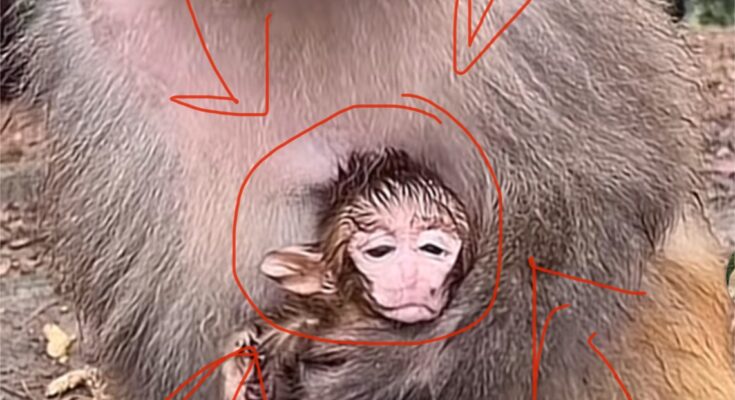The birth of a baby monkey at a wildlife sanctuary in [Location] brought initial joy and hope for conservationists and animal lovers alike. However, that joy turned into sorrow just a week later when the fragile infant passed away — a tragedy attributed to a lack of maternal care.
According to sanctuary staff, the baby was born to a first-time mother, a young female monkey who showed signs early on that she was unprepared for the demands of motherhood. Caretakers noticed that the mother was not consistently nursing the infant, nor was she keeping it close for warmth and protection. Despite their best efforts to intervene minimally to avoid stressing the mother, the baby began showing signs of weakness and malnourishment just days after birth.
“Sadly, this isn’t uncommon in the animal world, especially among primates born in captivity or to inexperienced mothers,” said Dr. Lena Martinez, a primate behavior specialist who consults with the sanctuary. “Some mothers simply lack the instinctual behaviors needed to raise their young, particularly if they were orphaned themselves or raised without proper social modeling.”
The sanctuary staff attempted to step in and supplement the baby’s care without completely removing it from the mother. They tried to provide additional warmth and nutrition while still giving the mother chances to bond. Unfortunately, despite their intervention, the baby monkey succumbed to complications from dehydration and malnutrition.
This incident has sparked conversations about the challenges of breeding primates in captivity and the importance of maternal behavior in the survival of newborn animals. In the wild, young female monkeys typically observe their elders raising offspring, learning crucial skills through social interaction and observation. In captivity, this learning process is often disrupted, especially if the monkeys are hand-reared or housed in isolation during key developmental periods.
The sanctuary is now reviewing its protocols for maternal training and pre-birth preparations. Plans are underway to develop programs where pregnant or young female monkeys can be placed in environments with experienced mothers to help model proper infant care.
“Each loss is heartbreaking,” said sanctuary director Ana Clark. “But we’re committed to learning from this tragedy and ensuring we improve outcomes for future births.”
Animal behaviorists also note that, while human intervention can sometimes save neglected infants, it often comes at the cost of disrupting the natural bonding process, which can have long-term effects on the animal’s psychological development. Sanctuaries must walk a fine line between offering necessary aid and allowing nature to take its course.
This heartbreaking event serves as a reminder that even in the best care environments, the survival of newborn animals is never guaranteed. It also highlights the complexity of maternal behavior in primates — a trait shaped as much by experience and social learning as by instinct.
While the loss of the baby monkey is deeply felt by the sanctuary staff and visitors, it has prompted a renewed commitment to improving maternal support systems in captive environments. The hope remains that through better preparation and understanding, future newborns will have a better chance at life.



